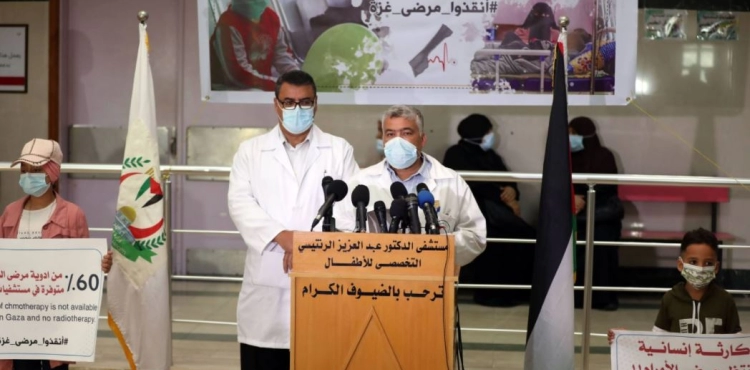An official at the Ministry of Health in the Gaza Strip said today, Sunday, that the acute shortage of medicines and treatment protocols for cancer patients in the Strip has reached about 60 percent.
Muhammad Abu Nada, in charge of the oncology department at Al-Rantisi Hospital in Gaza, warned that the continued lack of medicines poses a threat to the lives of patients in light of the diminished ability to provide treatment opportunities for these cancer patients.
During a press conference held by the Ministry of Health, on Sunday, Abu Nada issued an urgent distress call to all parties, to work quickly in order to provide these medicines and treatment protocols, noting that efforts have been made during the past few years in order to alleviate the suffering of patients, but every time they collide, These efforts are constrained by the blockade imposed on the sector and its consequences.
The medical official pointed out that the lack of treatment services, in addition to the restrictions imposed by the occupation on the movement of patients to travel for treatment in the West Bank, Jerusalem and the Palestinian interior, all these circumstances led to the loss of many patients´ lives, especially since the Ministry of Health in Gaza is the only body that provides care for cancer patients. It faces great challenges in providing services to them under these conditions, especially the lack of medicines and medical consumables needed for this.
Doctor Abu Nada points out that during 5 years, 8,644 different cases of cancer were diagnosed, at a rate of 90 cases per 100,000 people, and with numbers reaching 1,700 new cases each year, noting that about 3,000 deaths were recorded during the same period.
Abu Nada indicated that about 60 percent of cancer patients urgently need to travel for treatment in specialized centers outside the Gaza Strip, pointing out that these centers are located in the West Bank, Jerusalem and the interior, and have the possibility of radiotherapy, atomic scanning and chemotherapy that are not available in the Strip.
He pointed out that the occupation impedes the access of the majority of patients to those hospitals, which increases their suffering and leads to complications that are no longer treatable after it was possible to work to save their lives.
The head of the Oncology Department at Al-Rantissi Hospital called on the international community to pressure the occupation to lift its restrictions on the movement of patients and facilitate their access to specialized centers and hospitals, calling on international human rights and humanitarian institutions to support this right for patients to alleviate their suffering, and work to provide their medicines to the sector.












